
Hydrogen Peroxide for Plants: A Comprehensive Guide
Hydrogen peroxide (H2O2) is a versatile household chemical that has gained popularity among gardeners for its various benefits in plant care. This article will delve into the uses, benefits, and safe application methods of hydrogen peroxide for plants, helping you understand how to harness its potential to enhance your garden’s health.
What is Hydrogen Peroxide?
Hydrogen peroxide is a pale blue liquid that is slightly thicker than water. It is commonly available in a diluted form, typically 3% or 6% concentration, which is safe for household use. The chemical formula for hydrogen peroxide is H2O2, indicating it is simply water with an extra oxygen molecule attached.
Benefits of Hydrogen Peroxide for Plants
Hydrogen peroxide offers several benefits for plants, making it a valuable tool in gardening.
1. Soil Aeration:
- Oxygen Boost: Hydrogen peroxide helps aerate the soil by releasing oxygen, which is vital for root growth and nutrient uptake. This is particularly beneficial for compacted or anaerobic soils.
2. Root Growth and Health:
- Promotes Healthy Roots: Hydrogen peroxide encourages longer and faster root growth by providing oxygen to the roots. This improves nutrient absorption and overall plant health.
3. Pest and Disease Control:
- Fungal and Bacterial Control: Hydrogen peroxide can be used to treat fungal infections like root rot and powdery mildew. It also helps control bacterial diseases by killing off harmful pathogens.
- Insect Control: A diluted solution of hydrogen peroxide can deter pests such as aphids, spider mites, and fungus gnats.
4. Seed Treatment:
- Seed Sanitization: Soaking seeds in a diluted hydrogen peroxide solution can help kill off unwanted bacteria and fungi, promoting healthier seedlings and faster germination.
5. Disinfection:
- Tool and Equipment Disinfection: Hydrogen peroxide is effective in disinfecting garden tools, pots, and greenhouse equipment, reducing the risk of disease transmission.
6. General Plant Health:
- Boosts Plant Vigor: Hydrogen peroxide can be used to give struggling plants an extra boost by increasing oxygen availability, which helps in nutrient uptake and overall plant health.
Safe Application Methods
To ensure the safe and effective use of hydrogen peroxide for plants, follow these guidelines:
Dilution Ratios:
- General Use: For most applications, a 1:10 to 1:20 ratio of 3% hydrogen peroxide to water is recommended. For example, use 1 tablespoon of 3% hydrogen peroxide per gallon of water.
Soil Aeration:
- Direct Application: Apply the diluted solution directly to the soil to aerate it and provide oxygen to the roots.
Pest and Disease Control:
- Spray Solution: For treating fungal diseases and pests, use a 1:10 ratio of 3% hydrogen peroxide to water. Spray the solution on the affected areas, ensuring not to get it on healthy leaves.
Seed Treatment:
- Soaking Seeds: Soak seeds in a 1:4 ratio of 3% hydrogen peroxide to water for up to four hours before planting.
Precautions and Considerations
While hydrogen peroxide can be beneficial for plants, there are some precautions to consider:
Concentration:
- Avoid Overuse: Always dilute hydrogen peroxide according to the recommended ratios to avoid damaging plant tissues. Undiluted or highly concentrated hydrogen peroxide can be harmful.
Safety:
- Protective Gear: Wear gloves and protective clothing when handling hydrogen peroxide to avoid skin and eye irritation. Keep pets and children away from the area where hydrogen peroxide is being used.
FAQ Section
Q: What are the benefits of using hydrogen peroxide for plants?
- A: Hydrogen peroxide helps aerate the soil, promotes healthy root growth, controls pests and diseases, disinfects tools and equipment, and boosts overall plant health.
Q: How do I use hydrogen peroxide to aerate the soil?
- A: Apply a diluted solution of 1 tablespoon of 3% hydrogen peroxide per gallon of water directly to the soil to aerate it and provide oxygen to the roots.
Q: Can hydrogen peroxide be used to treat fungal diseases in plants?
- A: Yes, a diluted solution of hydrogen peroxide can be used to treat fungal infections like root rot and powdery mildew. Use a 1:10 ratio of 3% hydrogen peroxide to water and spray it on the affected areas.
Q: How do I use hydrogen peroxide to disinfect garden tools and equipment?
- A: Use a 1:1 or 1:2 ratio of 3% hydrogen peroxide to water to disinfect garden tools, pots, and greenhouse equipment.
Q: Is hydrogen peroxide safe for seeds?
- A: Yes, soaking seeds in a diluted solution of 1:4 ratio of 3% hydrogen peroxide to water can help kill off unwanted bacteria and fungi, promoting healthier seedlings and faster germination.
Q: What precautions should I take when using hydrogen peroxide for plants?
- A: Always dilute hydrogen peroxide according to the recommended ratios, wear protective gear, and keep pets and children away from the area where hydrogen peroxide is being used.
Table: Key Information
| Category | Description |
|---|---|
| Chemical Formula | H2O2 (water with an extra oxygen molecule) |
| Common Concentrations | 3% or 6% diluted form |
| Soil Aeration | Releases oxygen, beneficial for compacted or anaerobic soils |
| Root Growth | Promotes longer and faster root growth, improves nutrient uptake |
| Pest and Disease Control | Treats fungal infections, controls pests like aphids and fungus gnats |
| Seed Treatment | Sanitizes seeds, promotes faster germination |
| Disinfection | Disinfects garden tools, pots, and greenhouse equipment |
| General Plant Health | Boosts plant vigor by increasing oxygen availability |
| Dilution Ratios | 1:10 to 1:20 ratio of 3% hydrogen peroxide to water for most applications |
| Precautions | Avoid overuse, wear protective gear, keep pets and children away |
Additional Resources
For more detailed information on the safe use of hydrogen peroxide in gardening, you can refer to various gardening resources and blogs.
Wikipedia Link
- Hydrogen Peroxide: Wikipedia
This comprehensive guide provides an in-depth look at the benefits and safe application methods of hydrogen peroxide for plants. By understanding these aspects, you can effectively use this household chemical to enhance your garden’s health and productivity.
Conclusion
Hydrogen peroxide is a versatile and beneficial tool for gardeners, offering a range of advantages from soil aeration to pest and disease control. By following the recommended dilution ratios and application methods, you can harness the power of hydrogen peroxide to create a healthier and more thriving garden.
Final Thoughts
Using hydrogen peroxide in your garden is a simple yet effective way to address various common gardening issues. Whether you are dealing with compacted soil, fungal infections, or pest infestations, hydrogen peroxide can provide a safe and eco-friendly solution. Always remember to use it in moderation and follow the recommended safety precautions to ensure the best results for your plants.


